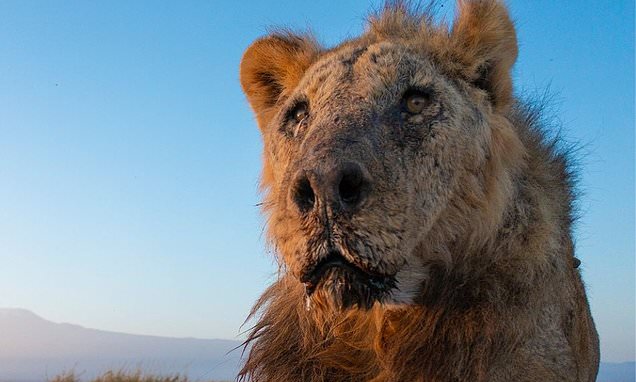Kenyan lion believed to have been the world’s oldest in the wild dies after being speared by herders
- He was speared to death by Maasai morans (warriors) on Wednesday night
- There are just 23,000 lions left in the wild and are now a ‘vulnerable species’
- READ MORE: The majesty of wild Africa caught on camera
A Kenyan lion, who is believed to be the world’s oldest, has died after he was speared by herders, according to wildlife officials.
Loonkito, 19, was brutally speared to death by Maasai morans (warriors) on Wednesday night after he was caught preying on livestock in Olkelunyiet village.
This King of the Jungle was admired for years by wildlife conservationists as most lions do not typically survive for so long in the wild.
The village Loonkito visited is just on the outskirts of Amboseli National Park which is famous for being the best place in Africa to get close to free-ranging elephants and other wildlife species.
The great predator was dubbed the ‘legendary big cat warrior’ by Kenya Wildlife Service (KWS) after he defended his territory for over a decade.

Loonkito, 19, was brutally speared to death by Maasai morans (warriors) on Wednesday night after he was caught preying on livestock in Olkelunyiet village

African lions typically have a lifespan of up to 18 years in the wild, according to conservation group Cats for Africa
https://youtube.com/watch?v=gm2SPd0c9tY%3Frel%3D0%26showinfo%3D1%26hl%3Den-US
KWS spokesman, Paul Jinaro said: ‘It was an old lion that had issues… getting prey on its own and livestock is easy prey.
‘A normal lion would go for wildlife inside the park.’
African lions typically have a lifespan of up to 18 years in the wild, according to conservation group Cats for Africa.
There are just over 100 lions in Amboseli and the big cats are considered ‘vulnerable’ on the International Union for the Conservation of Nature (IUCN) Red List of Threatened Species.
There are just 23,000 lions left in the wild as their population has decreased by 90 per cent over the last decade, according to African Impact.
Almost all lions live in Africa with a small population in India, according to the World Wildlife Federation.
Loonkito cannot be officially confirmed as the oldest in the world but he was very old lion and surpassed the average survival age.
Conservation group Lion Guardians eulogised Loonkito as ‘a symbol of resilience and coexistence.’
‘It is with heavy hearts that we share the news of the passing of Loonkito (2004 – 2023), the oldest male lion in our ecosystem and possibly in Africa,’ the non-profit said on Facebook.
Reports of wildlife straying into human habitats in Kenya have increased in recent years as the animals come under growing pressure from cities expanding into ancient migration and hunting grounds.
“People need to be sensitised on looking for a way to alert us and then we can take animals back to the parks,” KWS official Jinaro said.
In July 2021, a lion caused panic after straying from its habitat in Nairobi National Park into a crowded neighbourhood during morning rush hour.
The park is just seven kilometres (four miles) from the heart of Kenya’s capital, and incidents of animals escaping the grassy plains and wandering into the chaotic metropolis of more than four million people are not unheard of.
In December 2019, a lion mauled a man to death just outside the park, while in March 2016 another cat was shot dead after attacking and injuring a nearby resident.
Just a month before that, in February 2016, two lions spent a day wandering through Kibera, a densely packed city slum, before returning to the park, and days later more lions were spotted in town.
There are an estimated 2,500 lions in Kenya, according to the country’s first-ever national wildlife census conducted in 2021.
Source: Read Full Article
